The Consequences of Political Hacking and Defense Evaluation
VerifiedAdded on 2023/06/11
|11
|3363
|289
Essay
AI Summary
This essay examines the potential consequences of politically motivated hacking activities and evaluates the effectiveness of current defense systems. It begins by introducing the increasing threat of cybercrime driven by political motives, such as election manipulation and the spread of misinformation. The paper delves into how political motivations fuel cyber-attacks, including retrieving information from opposing parties, gaining knowledge for policy development, security testing, and political movements through social media. It then discusses the potential consequences of such hacking, including financial losses, compromised personal information, and threats to national security, highlighting the impact of hacktivism and cyberterrorism. The essay concludes by evaluating current defensive systems, noting their limitations and suggesting improvements like enhanced security procedures, cryptographic algorithms, proactive monitoring, and robust validation processes to bolster confidence in ICT technologies.
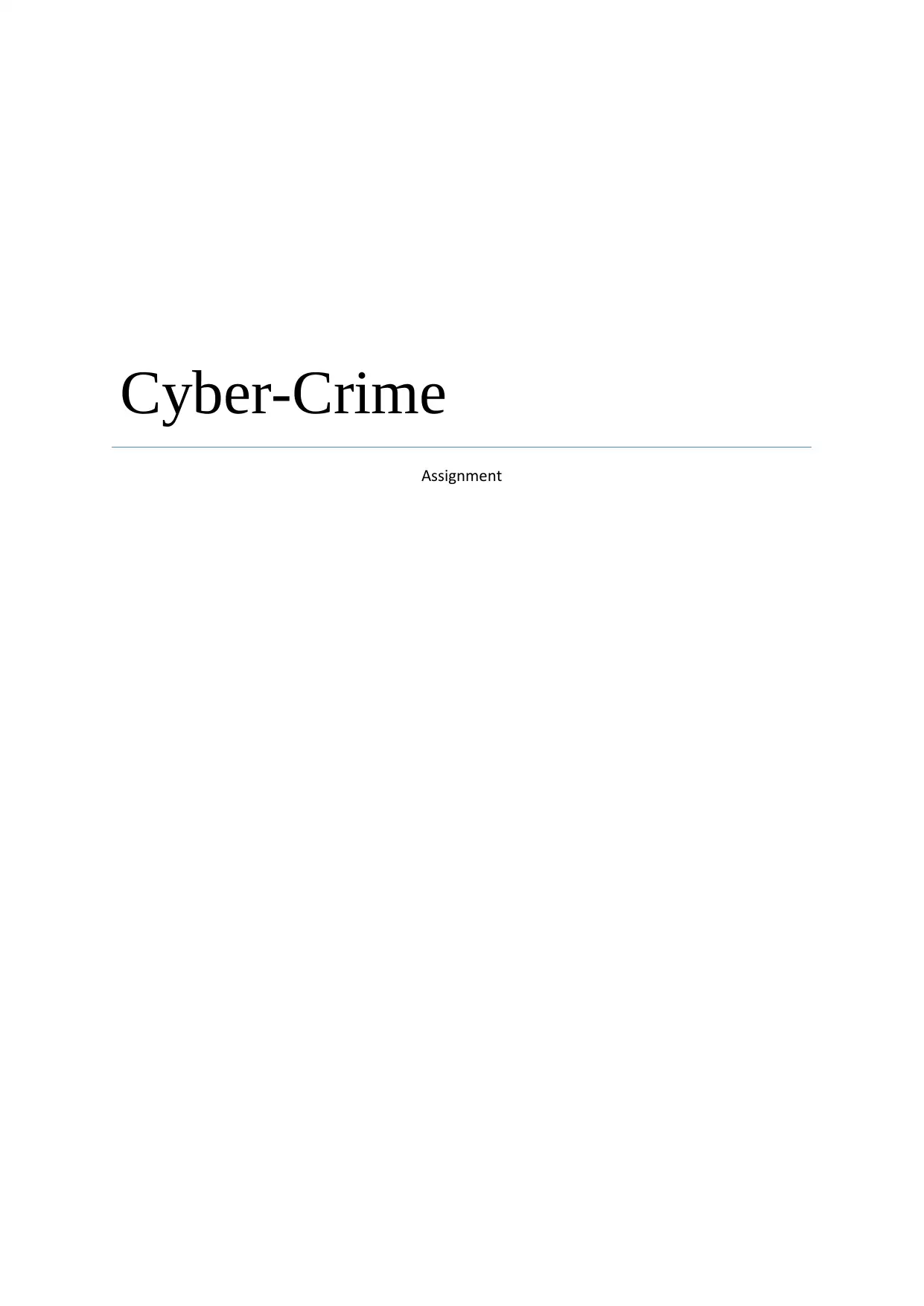
Cyber-Crime
Assignment
Assignment
Paraphrase This Document
Need a fresh take? Get an instant paraphrase of this document with our AI Paraphraser
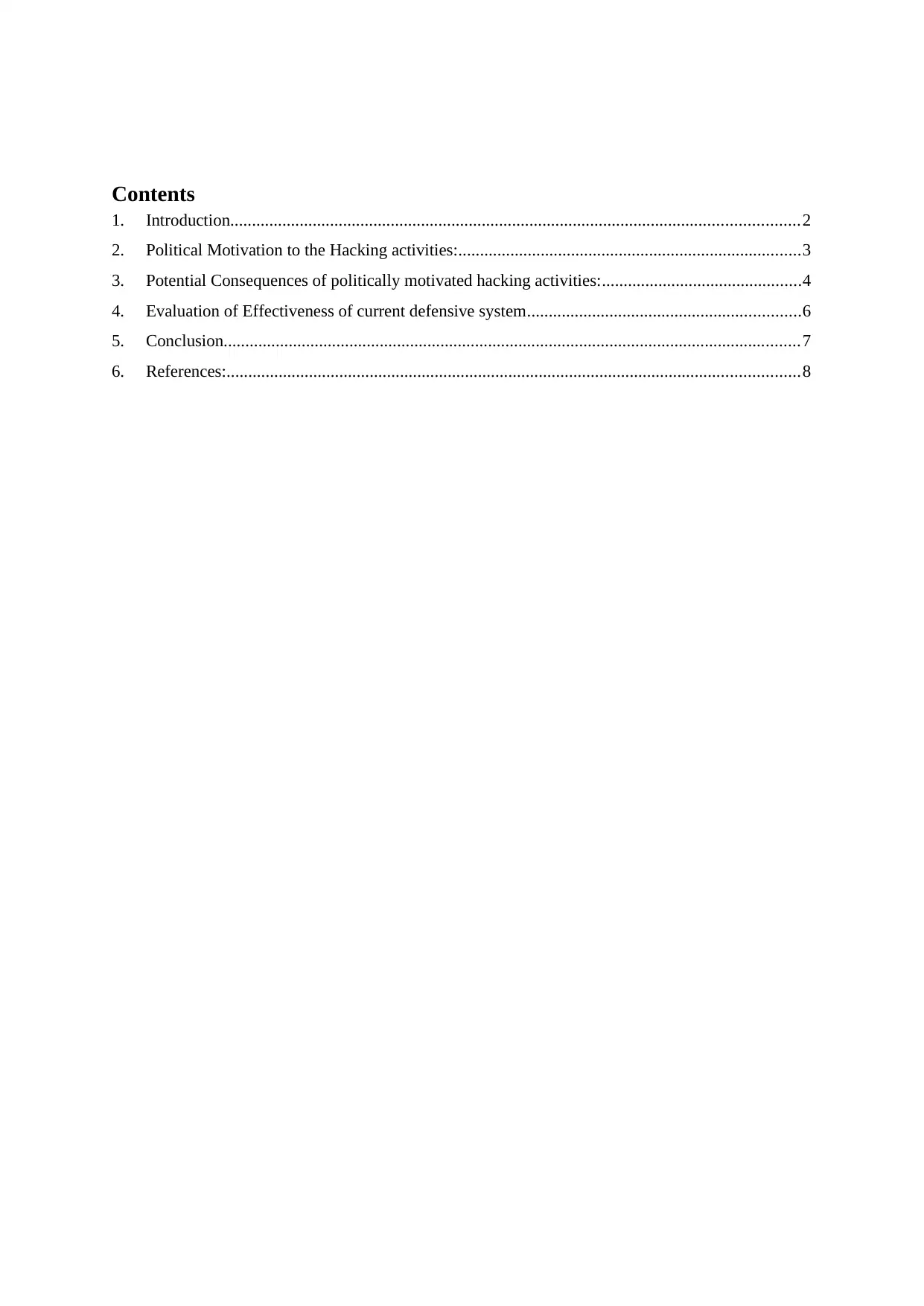
Contents
1. Introduction...................................................................................................................................2
2. Political Motivation to the Hacking activities:...............................................................................3
3. Potential Consequences of politically motivated hacking activities:..............................................4
4. Evaluation of Effectiveness of current defensive system...............................................................6
5. Conclusion.....................................................................................................................................7
6. References:....................................................................................................................................8
1. Introduction...................................................................................................................................2
2. Political Motivation to the Hacking activities:...............................................................................3
3. Potential Consequences of politically motivated hacking activities:..............................................4
4. Evaluation of Effectiveness of current defensive system...............................................................6
5. Conclusion.....................................................................................................................................7
6. References:....................................................................................................................................8
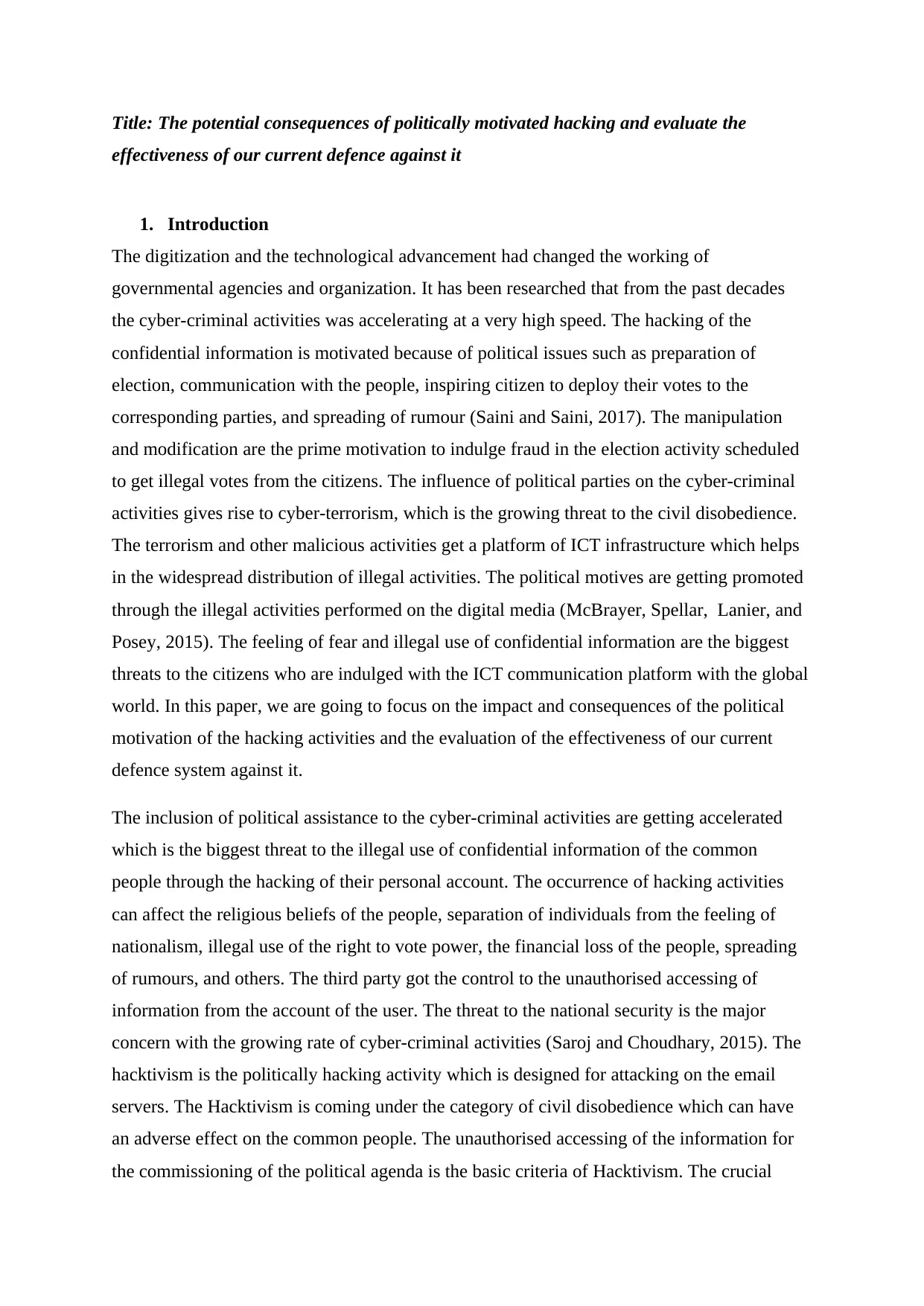
Title: The potential consequences of politically motivated hacking and evaluate the
effectiveness of our current defence against it
1. Introduction
The digitization and the technological advancement had changed the working of
governmental agencies and organization. It has been researched that from the past decades
the cyber-criminal activities was accelerating at a very high speed. The hacking of the
confidential information is motivated because of political issues such as preparation of
election, communication with the people, inspiring citizen to deploy their votes to the
corresponding parties, and spreading of rumour (Saini and Saini, 2017). The manipulation
and modification are the prime motivation to indulge fraud in the election activity scheduled
to get illegal votes from the citizens. The influence of political parties on the cyber-criminal
activities gives rise to cyber-terrorism, which is the growing threat to the civil disobedience.
The terrorism and other malicious activities get a platform of ICT infrastructure which helps
in the widespread distribution of illegal activities. The political motives are getting promoted
through the illegal activities performed on the digital media (McBrayer, Spellar, Lanier, and
Posey, 2015). The feeling of fear and illegal use of confidential information are the biggest
threats to the citizens who are indulged with the ICT communication platform with the global
world. In this paper, we are going to focus on the impact and consequences of the political
motivation of the hacking activities and the evaluation of the effectiveness of our current
defence system against it.
The inclusion of political assistance to the cyber-criminal activities are getting accelerated
which is the biggest threat to the illegal use of confidential information of the common
people through the hacking of their personal account. The occurrence of hacking activities
can affect the religious beliefs of the people, separation of individuals from the feeling of
nationalism, illegal use of the right to vote power, the financial loss of the people, spreading
of rumours, and others. The third party got the control to the unauthorised accessing of
information from the account of the user. The threat to the national security is the major
concern with the growing rate of cyber-criminal activities (Saroj and Choudhary, 2015). The
hacktivism is the politically hacking activity which is designed for attacking on the email
servers. The Hacktivism is coming under the category of civil disobedience which can have
an adverse effect on the common people. The unauthorised accessing of the information for
the commissioning of the political agenda is the basic criteria of Hacktivism. The crucial
effectiveness of our current defence against it
1. Introduction
The digitization and the technological advancement had changed the working of
governmental agencies and organization. It has been researched that from the past decades
the cyber-criminal activities was accelerating at a very high speed. The hacking of the
confidential information is motivated because of political issues such as preparation of
election, communication with the people, inspiring citizen to deploy their votes to the
corresponding parties, and spreading of rumour (Saini and Saini, 2017). The manipulation
and modification are the prime motivation to indulge fraud in the election activity scheduled
to get illegal votes from the citizens. The influence of political parties on the cyber-criminal
activities gives rise to cyber-terrorism, which is the growing threat to the civil disobedience.
The terrorism and other malicious activities get a platform of ICT infrastructure which helps
in the widespread distribution of illegal activities. The political motives are getting promoted
through the illegal activities performed on the digital media (McBrayer, Spellar, Lanier, and
Posey, 2015). The feeling of fear and illegal use of confidential information are the biggest
threats to the citizens who are indulged with the ICT communication platform with the global
world. In this paper, we are going to focus on the impact and consequences of the political
motivation of the hacking activities and the evaluation of the effectiveness of our current
defence system against it.
The inclusion of political assistance to the cyber-criminal activities are getting accelerated
which is the biggest threat to the illegal use of confidential information of the common
people through the hacking of their personal account. The occurrence of hacking activities
can affect the religious beliefs of the people, separation of individuals from the feeling of
nationalism, illegal use of the right to vote power, the financial loss of the people, spreading
of rumours, and others. The third party got the control to the unauthorised accessing of
information from the account of the user. The threat to the national security is the major
concern with the growing rate of cyber-criminal activities (Saroj and Choudhary, 2015). The
hacktivism is the politically hacking activity which is designed for attacking on the email
servers. The Hacktivism is coming under the category of civil disobedience which can have
an adverse effect on the common people. The unauthorised accessing of the information for
the commissioning of the political agenda is the basic criteria of Hacktivism. The crucial
⊘ This is a preview!⊘
Do you want full access?
Subscribe today to unlock all pages.

Trusted by 1+ million students worldwide
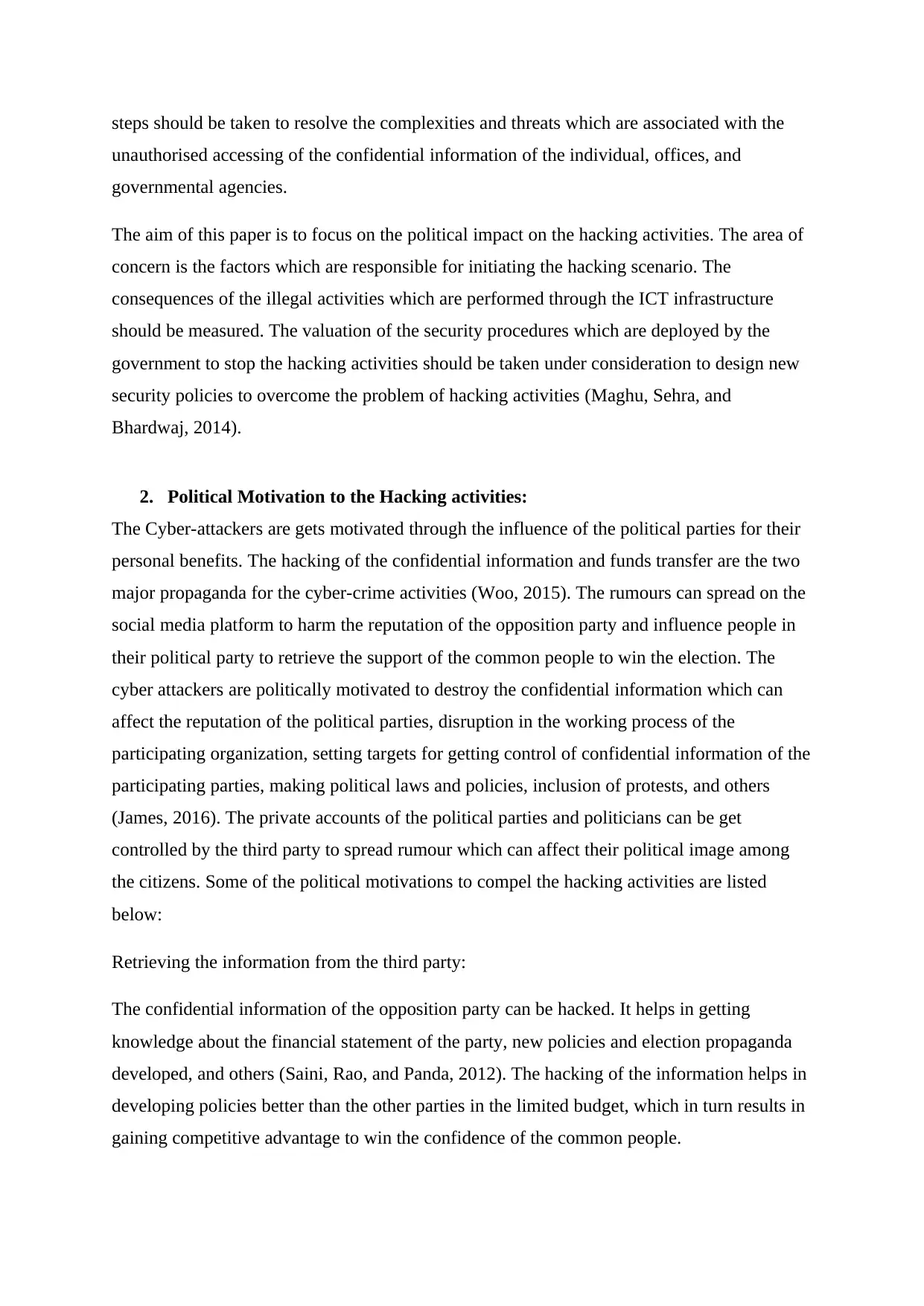
steps should be taken to resolve the complexities and threats which are associated with the
unauthorised accessing of the confidential information of the individual, offices, and
governmental agencies.
The aim of this paper is to focus on the political impact on the hacking activities. The area of
concern is the factors which are responsible for initiating the hacking scenario. The
consequences of the illegal activities which are performed through the ICT infrastructure
should be measured. The valuation of the security procedures which are deployed by the
government to stop the hacking activities should be taken under consideration to design new
security policies to overcome the problem of hacking activities (Maghu, Sehra, and
Bhardwaj, 2014).
2. Political Motivation to the Hacking activities:
The Cyber-attackers are gets motivated through the influence of the political parties for their
personal benefits. The hacking of the confidential information and funds transfer are the two
major propaganda for the cyber-crime activities (Woo, 2015). The rumours can spread on the
social media platform to harm the reputation of the opposition party and influence people in
their political party to retrieve the support of the common people to win the election. The
cyber attackers are politically motivated to destroy the confidential information which can
affect the reputation of the political parties, disruption in the working process of the
participating organization, setting targets for getting control of confidential information of the
participating parties, making political laws and policies, inclusion of protests, and others
(James, 2016). The private accounts of the political parties and politicians can be get
controlled by the third party to spread rumour which can affect their political image among
the citizens. Some of the political motivations to compel the hacking activities are listed
below:
Retrieving the information from the third party:
The confidential information of the opposition party can be hacked. It helps in getting
knowledge about the financial statement of the party, new policies and election propaganda
developed, and others (Saini, Rao, and Panda, 2012). The hacking of the information helps in
developing policies better than the other parties in the limited budget, which in turn results in
gaining competitive advantage to win the confidence of the common people.
unauthorised accessing of the confidential information of the individual, offices, and
governmental agencies.
The aim of this paper is to focus on the political impact on the hacking activities. The area of
concern is the factors which are responsible for initiating the hacking scenario. The
consequences of the illegal activities which are performed through the ICT infrastructure
should be measured. The valuation of the security procedures which are deployed by the
government to stop the hacking activities should be taken under consideration to design new
security policies to overcome the problem of hacking activities (Maghu, Sehra, and
Bhardwaj, 2014).
2. Political Motivation to the Hacking activities:
The Cyber-attackers are gets motivated through the influence of the political parties for their
personal benefits. The hacking of the confidential information and funds transfer are the two
major propaganda for the cyber-crime activities (Woo, 2015). The rumours can spread on the
social media platform to harm the reputation of the opposition party and influence people in
their political party to retrieve the support of the common people to win the election. The
cyber attackers are politically motivated to destroy the confidential information which can
affect the reputation of the political parties, disruption in the working process of the
participating organization, setting targets for getting control of confidential information of the
participating parties, making political laws and policies, inclusion of protests, and others
(James, 2016). The private accounts of the political parties and politicians can be get
controlled by the third party to spread rumour which can affect their political image among
the citizens. Some of the political motivations to compel the hacking activities are listed
below:
Retrieving the information from the third party:
The confidential information of the opposition party can be hacked. It helps in getting
knowledge about the financial statement of the party, new policies and election propaganda
developed, and others (Saini, Rao, and Panda, 2012). The hacking of the information helps in
developing policies better than the other parties in the limited budget, which in turn results in
gaining competitive advantage to win the confidence of the common people.
Paraphrase This Document
Need a fresh take? Get an instant paraphrase of this document with our AI Paraphraser
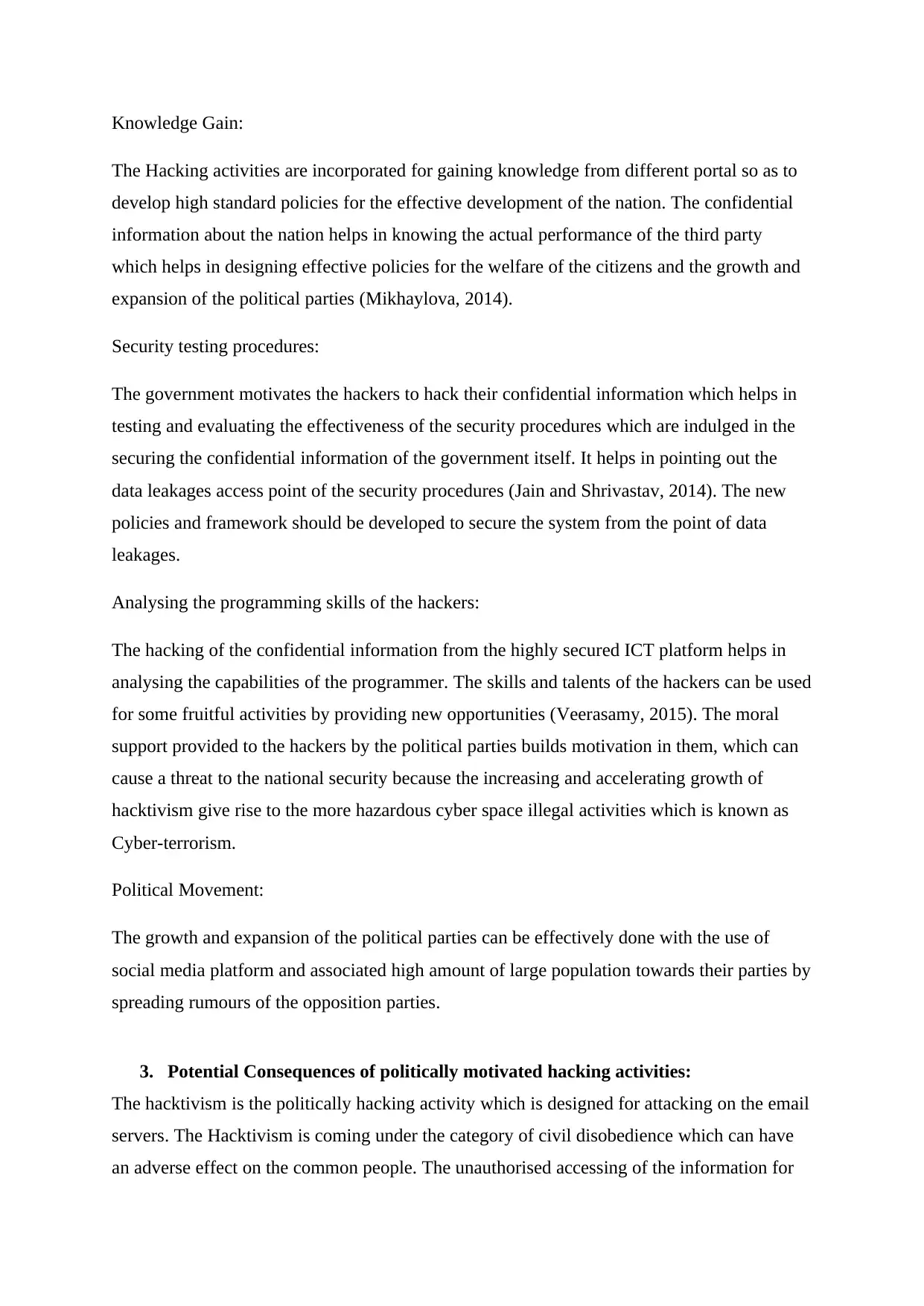
Knowledge Gain:
The Hacking activities are incorporated for gaining knowledge from different portal so as to
develop high standard policies for the effective development of the nation. The confidential
information about the nation helps in knowing the actual performance of the third party
which helps in designing effective policies for the welfare of the citizens and the growth and
expansion of the political parties (Mikhaylova, 2014).
Security testing procedures:
The government motivates the hackers to hack their confidential information which helps in
testing and evaluating the effectiveness of the security procedures which are indulged in the
securing the confidential information of the government itself. It helps in pointing out the
data leakages access point of the security procedures (Jain and Shrivastav, 2014). The new
policies and framework should be developed to secure the system from the point of data
leakages.
Analysing the programming skills of the hackers:
The hacking of the confidential information from the highly secured ICT platform helps in
analysing the capabilities of the programmer. The skills and talents of the hackers can be used
for some fruitful activities by providing new opportunities (Veerasamy, 2015). The moral
support provided to the hackers by the political parties builds motivation in them, which can
cause a threat to the national security because the increasing and accelerating growth of
hacktivism give rise to the more hazardous cyber space illegal activities which is known as
Cyber-terrorism.
Political Movement:
The growth and expansion of the political parties can be effectively done with the use of
social media platform and associated high amount of large population towards their parties by
spreading rumours of the opposition parties.
3. Potential Consequences of politically motivated hacking activities:
The hacktivism is the politically hacking activity which is designed for attacking on the email
servers. The Hacktivism is coming under the category of civil disobedience which can have
an adverse effect on the common people. The unauthorised accessing of the information for
The Hacking activities are incorporated for gaining knowledge from different portal so as to
develop high standard policies for the effective development of the nation. The confidential
information about the nation helps in knowing the actual performance of the third party
which helps in designing effective policies for the welfare of the citizens and the growth and
expansion of the political parties (Mikhaylova, 2014).
Security testing procedures:
The government motivates the hackers to hack their confidential information which helps in
testing and evaluating the effectiveness of the security procedures which are indulged in the
securing the confidential information of the government itself. It helps in pointing out the
data leakages access point of the security procedures (Jain and Shrivastav, 2014). The new
policies and framework should be developed to secure the system from the point of data
leakages.
Analysing the programming skills of the hackers:
The hacking of the confidential information from the highly secured ICT platform helps in
analysing the capabilities of the programmer. The skills and talents of the hackers can be used
for some fruitful activities by providing new opportunities (Veerasamy, 2015). The moral
support provided to the hackers by the political parties builds motivation in them, which can
cause a threat to the national security because the increasing and accelerating growth of
hacktivism give rise to the more hazardous cyber space illegal activities which is known as
Cyber-terrorism.
Political Movement:
The growth and expansion of the political parties can be effectively done with the use of
social media platform and associated high amount of large population towards their parties by
spreading rumours of the opposition parties.
3. Potential Consequences of politically motivated hacking activities:
The hacktivism is the politically hacking activity which is designed for attacking on the email
servers. The Hacktivism is coming under the category of civil disobedience which can have
an adverse effect on the common people. The unauthorised accessing of the information for
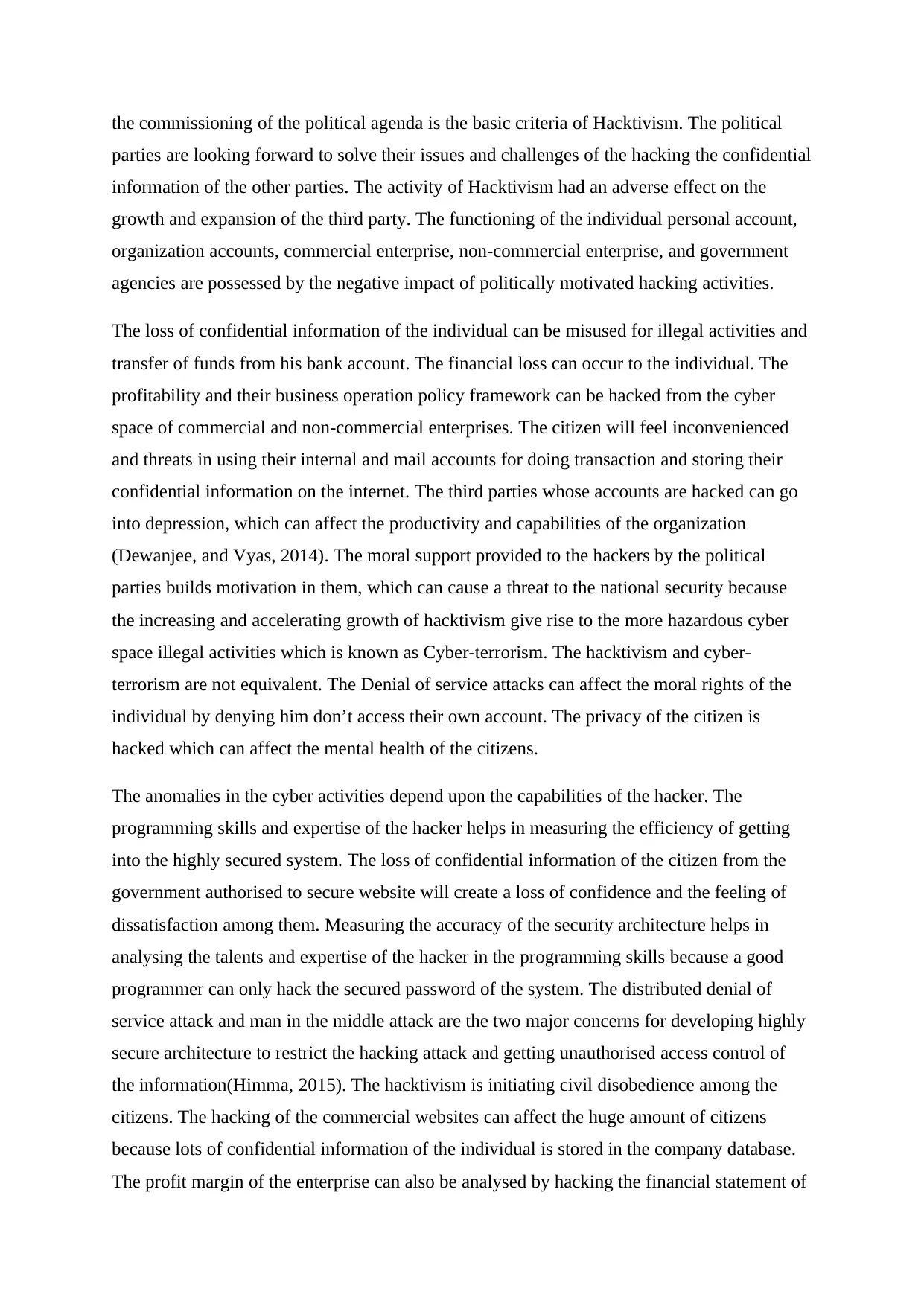
the commissioning of the political agenda is the basic criteria of Hacktivism. The political
parties are looking forward to solve their issues and challenges of the hacking the confidential
information of the other parties. The activity of Hacktivism had an adverse effect on the
growth and expansion of the third party. The functioning of the individual personal account,
organization accounts, commercial enterprise, non-commercial enterprise, and government
agencies are possessed by the negative impact of politically motivated hacking activities.
The loss of confidential information of the individual can be misused for illegal activities and
transfer of funds from his bank account. The financial loss can occur to the individual. The
profitability and their business operation policy framework can be hacked from the cyber
space of commercial and non-commercial enterprises. The citizen will feel inconvenienced
and threats in using their internal and mail accounts for doing transaction and storing their
confidential information on the internet. The third parties whose accounts are hacked can go
into depression, which can affect the productivity and capabilities of the organization
(Dewanjee, and Vyas, 2014). The moral support provided to the hackers by the political
parties builds motivation in them, which can cause a threat to the national security because
the increasing and accelerating growth of hacktivism give rise to the more hazardous cyber
space illegal activities which is known as Cyber-terrorism. The hacktivism and cyber-
terrorism are not equivalent. The Denial of service attacks can affect the moral rights of the
individual by denying him don’t access their own account. The privacy of the citizen is
hacked which can affect the mental health of the citizens.
The anomalies in the cyber activities depend upon the capabilities of the hacker. The
programming skills and expertise of the hacker helps in measuring the efficiency of getting
into the highly secured system. The loss of confidential information of the citizen from the
government authorised to secure website will create a loss of confidence and the feeling of
dissatisfaction among them. Measuring the accuracy of the security architecture helps in
analysing the talents and expertise of the hacker in the programming skills because a good
programmer can only hack the secured password of the system. The distributed denial of
service attack and man in the middle attack are the two major concerns for developing highly
secure architecture to restrict the hacking attack and getting unauthorised access control of
the information(Himma, 2015). The hacktivism is initiating civil disobedience among the
citizens. The hacking of the commercial websites can affect the huge amount of citizens
because lots of confidential information of the individual is stored in the company database.
The profit margin of the enterprise can also be analysed by hacking the financial statement of
parties are looking forward to solve their issues and challenges of the hacking the confidential
information of the other parties. The activity of Hacktivism had an adverse effect on the
growth and expansion of the third party. The functioning of the individual personal account,
organization accounts, commercial enterprise, non-commercial enterprise, and government
agencies are possessed by the negative impact of politically motivated hacking activities.
The loss of confidential information of the individual can be misused for illegal activities and
transfer of funds from his bank account. The financial loss can occur to the individual. The
profitability and their business operation policy framework can be hacked from the cyber
space of commercial and non-commercial enterprises. The citizen will feel inconvenienced
and threats in using their internal and mail accounts for doing transaction and storing their
confidential information on the internet. The third parties whose accounts are hacked can go
into depression, which can affect the productivity and capabilities of the organization
(Dewanjee, and Vyas, 2014). The moral support provided to the hackers by the political
parties builds motivation in them, which can cause a threat to the national security because
the increasing and accelerating growth of hacktivism give rise to the more hazardous cyber
space illegal activities which is known as Cyber-terrorism. The hacktivism and cyber-
terrorism are not equivalent. The Denial of service attacks can affect the moral rights of the
individual by denying him don’t access their own account. The privacy of the citizen is
hacked which can affect the mental health of the citizens.
The anomalies in the cyber activities depend upon the capabilities of the hacker. The
programming skills and expertise of the hacker helps in measuring the efficiency of getting
into the highly secured system. The loss of confidential information of the citizen from the
government authorised to secure website will create a loss of confidence and the feeling of
dissatisfaction among them. Measuring the accuracy of the security architecture helps in
analysing the talents and expertise of the hacker in the programming skills because a good
programmer can only hack the secured password of the system. The distributed denial of
service attack and man in the middle attack are the two major concerns for developing highly
secure architecture to restrict the hacking attack and getting unauthorised access control of
the information(Himma, 2015). The hacktivism is initiating civil disobedience among the
citizens. The hacking of the commercial websites can affect the huge amount of citizens
because lots of confidential information of the individual is stored in the company database.
The profit margin of the enterprise can also be analysed by hacking the financial statement of
⊘ This is a preview!⊘
Do you want full access?
Subscribe today to unlock all pages.

Trusted by 1+ million students worldwide
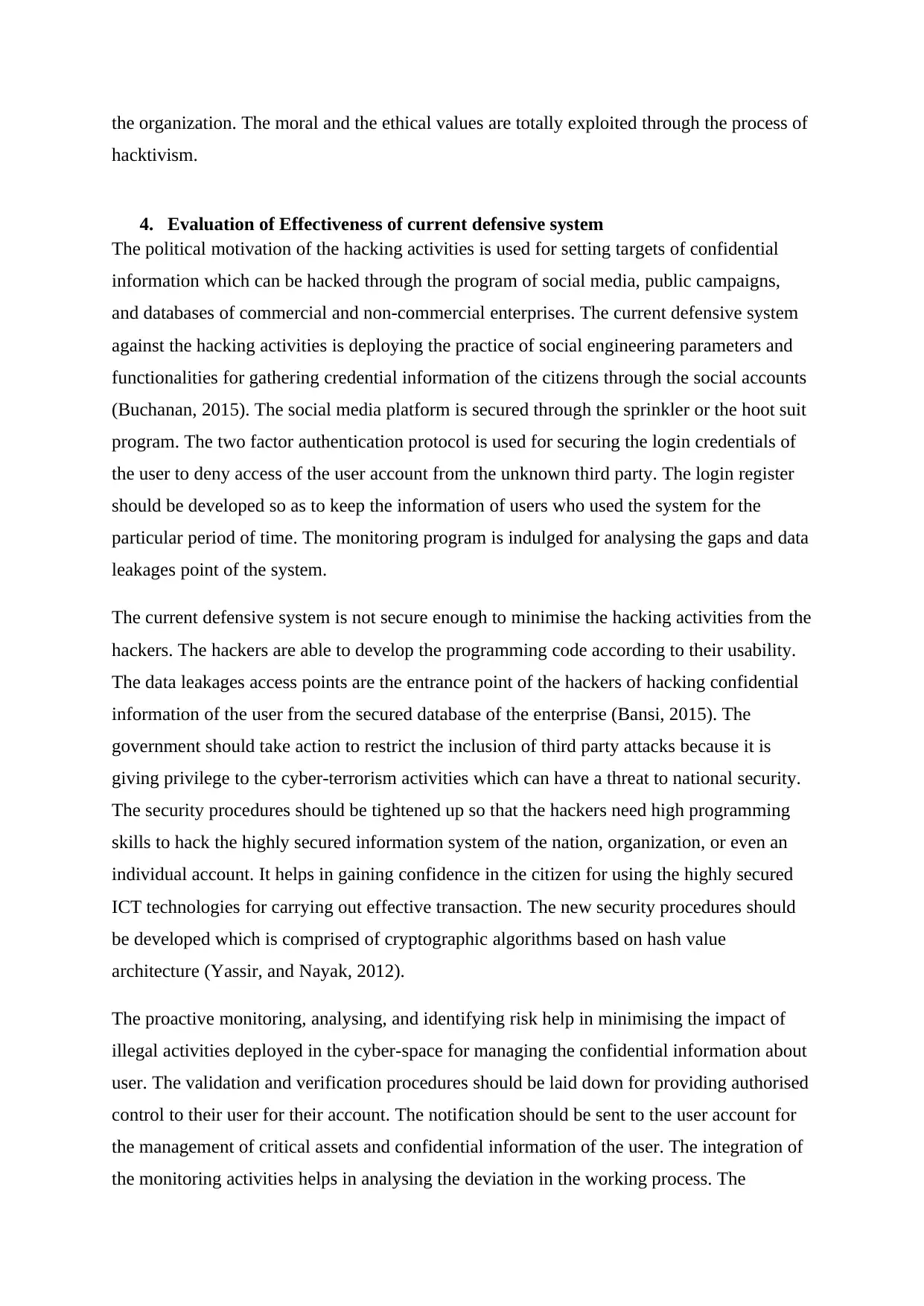
the organization. The moral and the ethical values are totally exploited through the process of
hacktivism.
4. Evaluation of Effectiveness of current defensive system
The political motivation of the hacking activities is used for setting targets of confidential
information which can be hacked through the program of social media, public campaigns,
and databases of commercial and non-commercial enterprises. The current defensive system
against the hacking activities is deploying the practice of social engineering parameters and
functionalities for gathering credential information of the citizens through the social accounts
(Buchanan, 2015). The social media platform is secured through the sprinkler or the hoot suit
program. The two factor authentication protocol is used for securing the login credentials of
the user to deny access of the user account from the unknown third party. The login register
should be developed so as to keep the information of users who used the system for the
particular period of time. The monitoring program is indulged for analysing the gaps and data
leakages point of the system.
The current defensive system is not secure enough to minimise the hacking activities from the
hackers. The hackers are able to develop the programming code according to their usability.
The data leakages access points are the entrance point of the hackers of hacking confidential
information of the user from the secured database of the enterprise (Bansi, 2015). The
government should take action to restrict the inclusion of third party attacks because it is
giving privilege to the cyber-terrorism activities which can have a threat to national security.
The security procedures should be tightened up so that the hackers need high programming
skills to hack the highly secured information system of the nation, organization, or even an
individual account. It helps in gaining confidence in the citizen for using the highly secured
ICT technologies for carrying out effective transaction. The new security procedures should
be developed which is comprised of cryptographic algorithms based on hash value
architecture (Yassir, and Nayak, 2012).
The proactive monitoring, analysing, and identifying risk help in minimising the impact of
illegal activities deployed in the cyber-space for managing the confidential information about
user. The validation and verification procedures should be laid down for providing authorised
control to their user for their account. The notification should be sent to the user account for
the management of critical assets and confidential information of the user. The integration of
the monitoring activities helps in analysing the deviation in the working process. The
hacktivism.
4. Evaluation of Effectiveness of current defensive system
The political motivation of the hacking activities is used for setting targets of confidential
information which can be hacked through the program of social media, public campaigns,
and databases of commercial and non-commercial enterprises. The current defensive system
against the hacking activities is deploying the practice of social engineering parameters and
functionalities for gathering credential information of the citizens through the social accounts
(Buchanan, 2015). The social media platform is secured through the sprinkler or the hoot suit
program. The two factor authentication protocol is used for securing the login credentials of
the user to deny access of the user account from the unknown third party. The login register
should be developed so as to keep the information of users who used the system for the
particular period of time. The monitoring program is indulged for analysing the gaps and data
leakages point of the system.
The current defensive system is not secure enough to minimise the hacking activities from the
hackers. The hackers are able to develop the programming code according to their usability.
The data leakages access points are the entrance point of the hackers of hacking confidential
information of the user from the secured database of the enterprise (Bansi, 2015). The
government should take action to restrict the inclusion of third party attacks because it is
giving privilege to the cyber-terrorism activities which can have a threat to national security.
The security procedures should be tightened up so that the hackers need high programming
skills to hack the highly secured information system of the nation, organization, or even an
individual account. It helps in gaining confidence in the citizen for using the highly secured
ICT technologies for carrying out effective transaction. The new security procedures should
be developed which is comprised of cryptographic algorithms based on hash value
architecture (Yassir, and Nayak, 2012).
The proactive monitoring, analysing, and identifying risk help in minimising the impact of
illegal activities deployed in the cyber-space for managing the confidential information about
user. The validation and verification procedures should be laid down for providing authorised
control to their user for their account. The notification should be sent to the user account for
the management of critical assets and confidential information of the user. The integration of
the monitoring activities helps in analysing the deviation in the working process. The
Paraphrase This Document
Need a fresh take? Get an instant paraphrase of this document with our AI Paraphraser
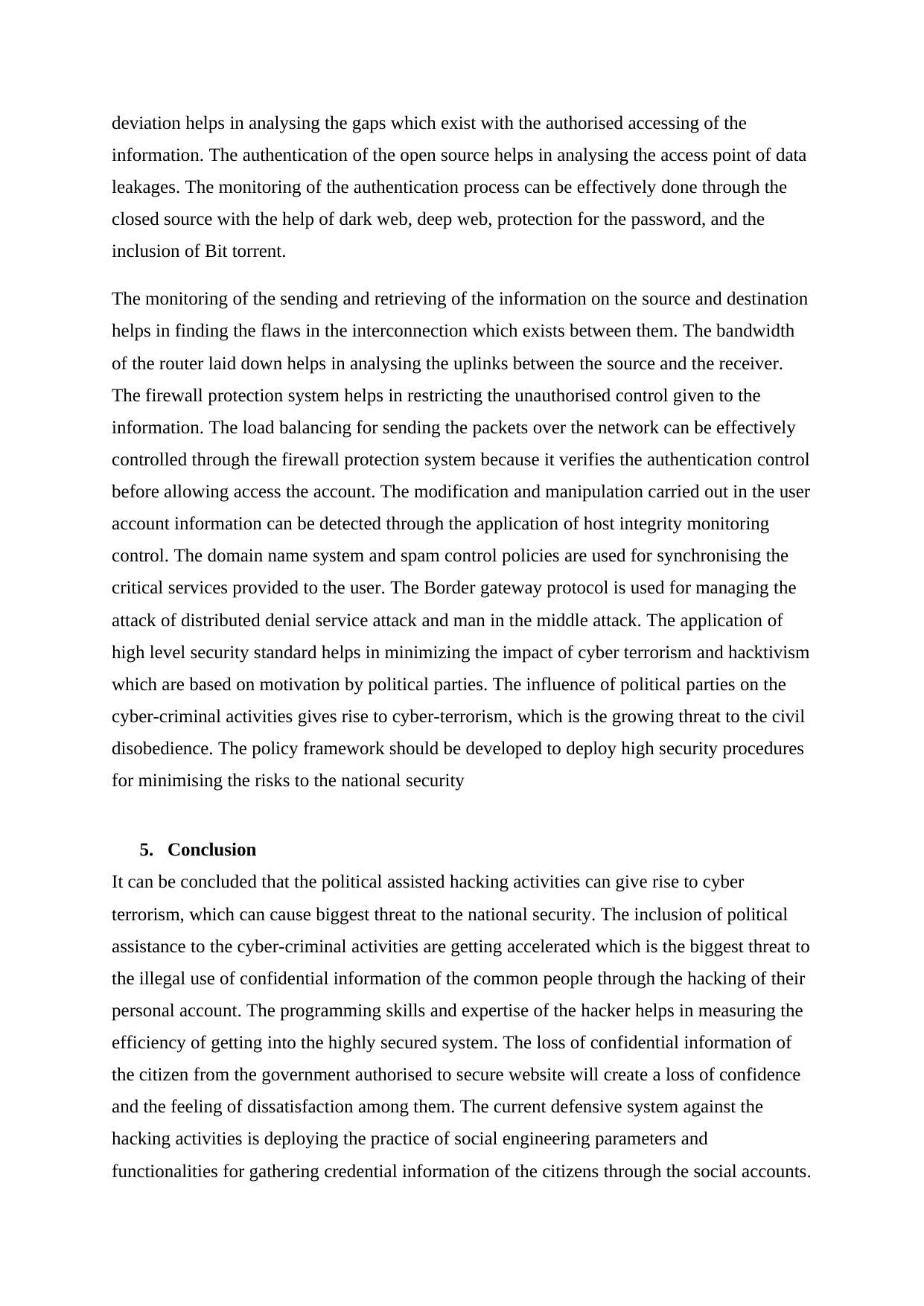
deviation helps in analysing the gaps which exist with the authorised accessing of the
information. The authentication of the open source helps in analysing the access point of data
leakages. The monitoring of the authentication process can be effectively done through the
closed source with the help of dark web, deep web, protection for the password, and the
inclusion of Bit torrent.
The monitoring of the sending and retrieving of the information on the source and destination
helps in finding the flaws in the interconnection which exists between them. The bandwidth
of the router laid down helps in analysing the uplinks between the source and the receiver.
The firewall protection system helps in restricting the unauthorised control given to the
information. The load balancing for sending the packets over the network can be effectively
controlled through the firewall protection system because it verifies the authentication control
before allowing access the account. The modification and manipulation carried out in the user
account information can be detected through the application of host integrity monitoring
control. The domain name system and spam control policies are used for synchronising the
critical services provided to the user. The Border gateway protocol is used for managing the
attack of distributed denial service attack and man in the middle attack. The application of
high level security standard helps in minimizing the impact of cyber terrorism and hacktivism
which are based on motivation by political parties. The influence of political parties on the
cyber-criminal activities gives rise to cyber-terrorism, which is the growing threat to the civil
disobedience. The policy framework should be developed to deploy high security procedures
for minimising the risks to the national security
5. Conclusion
It can be concluded that the political assisted hacking activities can give rise to cyber
terrorism, which can cause biggest threat to the national security. The inclusion of political
assistance to the cyber-criminal activities are getting accelerated which is the biggest threat to
the illegal use of confidential information of the common people through the hacking of their
personal account. The programming skills and expertise of the hacker helps in measuring the
efficiency of getting into the highly secured system. The loss of confidential information of
the citizen from the government authorised to secure website will create a loss of confidence
and the feeling of dissatisfaction among them. The current defensive system against the
hacking activities is deploying the practice of social engineering parameters and
functionalities for gathering credential information of the citizens through the social accounts.
information. The authentication of the open source helps in analysing the access point of data
leakages. The monitoring of the authentication process can be effectively done through the
closed source with the help of dark web, deep web, protection for the password, and the
inclusion of Bit torrent.
The monitoring of the sending and retrieving of the information on the source and destination
helps in finding the flaws in the interconnection which exists between them. The bandwidth
of the router laid down helps in analysing the uplinks between the source and the receiver.
The firewall protection system helps in restricting the unauthorised control given to the
information. The load balancing for sending the packets over the network can be effectively
controlled through the firewall protection system because it verifies the authentication control
before allowing access the account. The modification and manipulation carried out in the user
account information can be detected through the application of host integrity monitoring
control. The domain name system and spam control policies are used for synchronising the
critical services provided to the user. The Border gateway protocol is used for managing the
attack of distributed denial service attack and man in the middle attack. The application of
high level security standard helps in minimizing the impact of cyber terrorism and hacktivism
which are based on motivation by political parties. The influence of political parties on the
cyber-criminal activities gives rise to cyber-terrorism, which is the growing threat to the civil
disobedience. The policy framework should be developed to deploy high security procedures
for minimising the risks to the national security
5. Conclusion
It can be concluded that the political assisted hacking activities can give rise to cyber
terrorism, which can cause biggest threat to the national security. The inclusion of political
assistance to the cyber-criminal activities are getting accelerated which is the biggest threat to
the illegal use of confidential information of the common people through the hacking of their
personal account. The programming skills and expertise of the hacker helps in measuring the
efficiency of getting into the highly secured system. The loss of confidential information of
the citizen from the government authorised to secure website will create a loss of confidence
and the feeling of dissatisfaction among them. The current defensive system against the
hacking activities is deploying the practice of social engineering parameters and
functionalities for gathering credential information of the citizens through the social accounts.
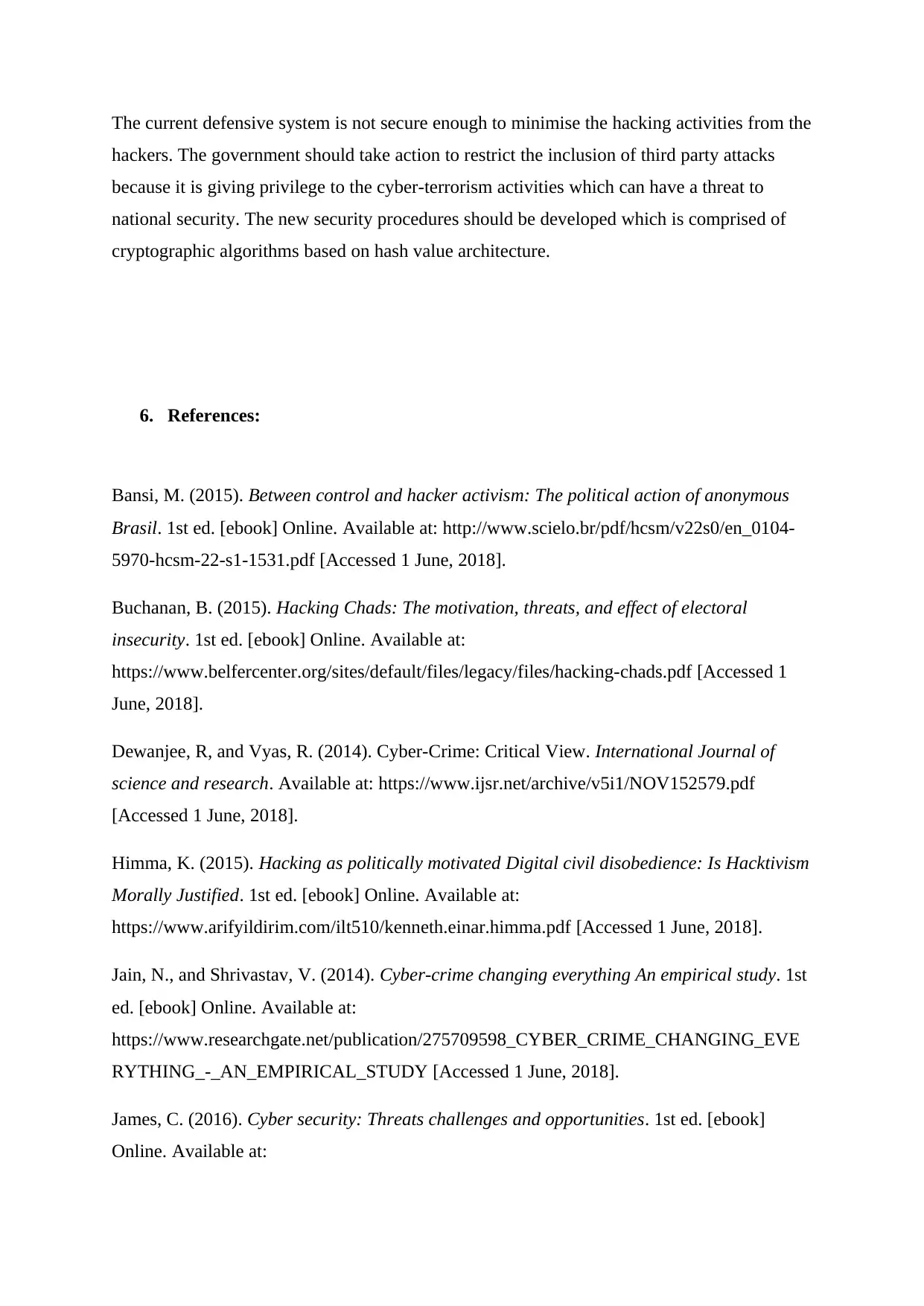
The current defensive system is not secure enough to minimise the hacking activities from the
hackers. The government should take action to restrict the inclusion of third party attacks
because it is giving privilege to the cyber-terrorism activities which can have a threat to
national security. The new security procedures should be developed which is comprised of
cryptographic algorithms based on hash value architecture.
6. References:
Bansi, M. (2015). Between control and hacker activism: The political action of anonymous
Brasil. 1st ed. [ebook] Online. Available at: http://www.scielo.br/pdf/hcsm/v22s0/en_0104-
5970-hcsm-22-s1-1531.pdf [Accessed 1 June, 2018].
Buchanan, B. (2015). Hacking Chads: The motivation, threats, and effect of electoral
insecurity. 1st ed. [ebook] Online. Available at:
https://www.belfercenter.org/sites/default/files/legacy/files/hacking-chads.pdf [Accessed 1
June, 2018].
Dewanjee, R, and Vyas, R. (2014). Cyber-Crime: Critical View. International Journal of
science and research. Available at: https://www.ijsr.net/archive/v5i1/NOV152579.pdf
[Accessed 1 June, 2018].
Himma, K. (2015). Hacking as politically motivated Digital civil disobedience: Is Hacktivism
Morally Justified. 1st ed. [ebook] Online. Available at:
https://www.arifyildirim.com/ilt510/kenneth.einar.himma.pdf [Accessed 1 June, 2018].
Jain, N., and Shrivastav, V. (2014). Cyber-crime changing everything An empirical study. 1st
ed. [ebook] Online. Available at:
https://www.researchgate.net/publication/275709598_CYBER_CRIME_CHANGING_EVE
RYTHING_-_AN_EMPIRICAL_STUDY [Accessed 1 June, 2018].
James, C. (2016). Cyber security: Threats challenges and opportunities. 1st ed. [ebook]
Online. Available at:
hackers. The government should take action to restrict the inclusion of third party attacks
because it is giving privilege to the cyber-terrorism activities which can have a threat to
national security. The new security procedures should be developed which is comprised of
cryptographic algorithms based on hash value architecture.
6. References:
Bansi, M. (2015). Between control and hacker activism: The political action of anonymous
Brasil. 1st ed. [ebook] Online. Available at: http://www.scielo.br/pdf/hcsm/v22s0/en_0104-
5970-hcsm-22-s1-1531.pdf [Accessed 1 June, 2018].
Buchanan, B. (2015). Hacking Chads: The motivation, threats, and effect of electoral
insecurity. 1st ed. [ebook] Online. Available at:
https://www.belfercenter.org/sites/default/files/legacy/files/hacking-chads.pdf [Accessed 1
June, 2018].
Dewanjee, R, and Vyas, R. (2014). Cyber-Crime: Critical View. International Journal of
science and research. Available at: https://www.ijsr.net/archive/v5i1/NOV152579.pdf
[Accessed 1 June, 2018].
Himma, K. (2015). Hacking as politically motivated Digital civil disobedience: Is Hacktivism
Morally Justified. 1st ed. [ebook] Online. Available at:
https://www.arifyildirim.com/ilt510/kenneth.einar.himma.pdf [Accessed 1 June, 2018].
Jain, N., and Shrivastav, V. (2014). Cyber-crime changing everything An empirical study. 1st
ed. [ebook] Online. Available at:
https://www.researchgate.net/publication/275709598_CYBER_CRIME_CHANGING_EVE
RYTHING_-_AN_EMPIRICAL_STUDY [Accessed 1 June, 2018].
James, C. (2016). Cyber security: Threats challenges and opportunities. 1st ed. [ebook]
Online. Available at:
⊘ This is a preview!⊘
Do you want full access?
Subscribe today to unlock all pages.

Trusted by 1+ million students worldwide
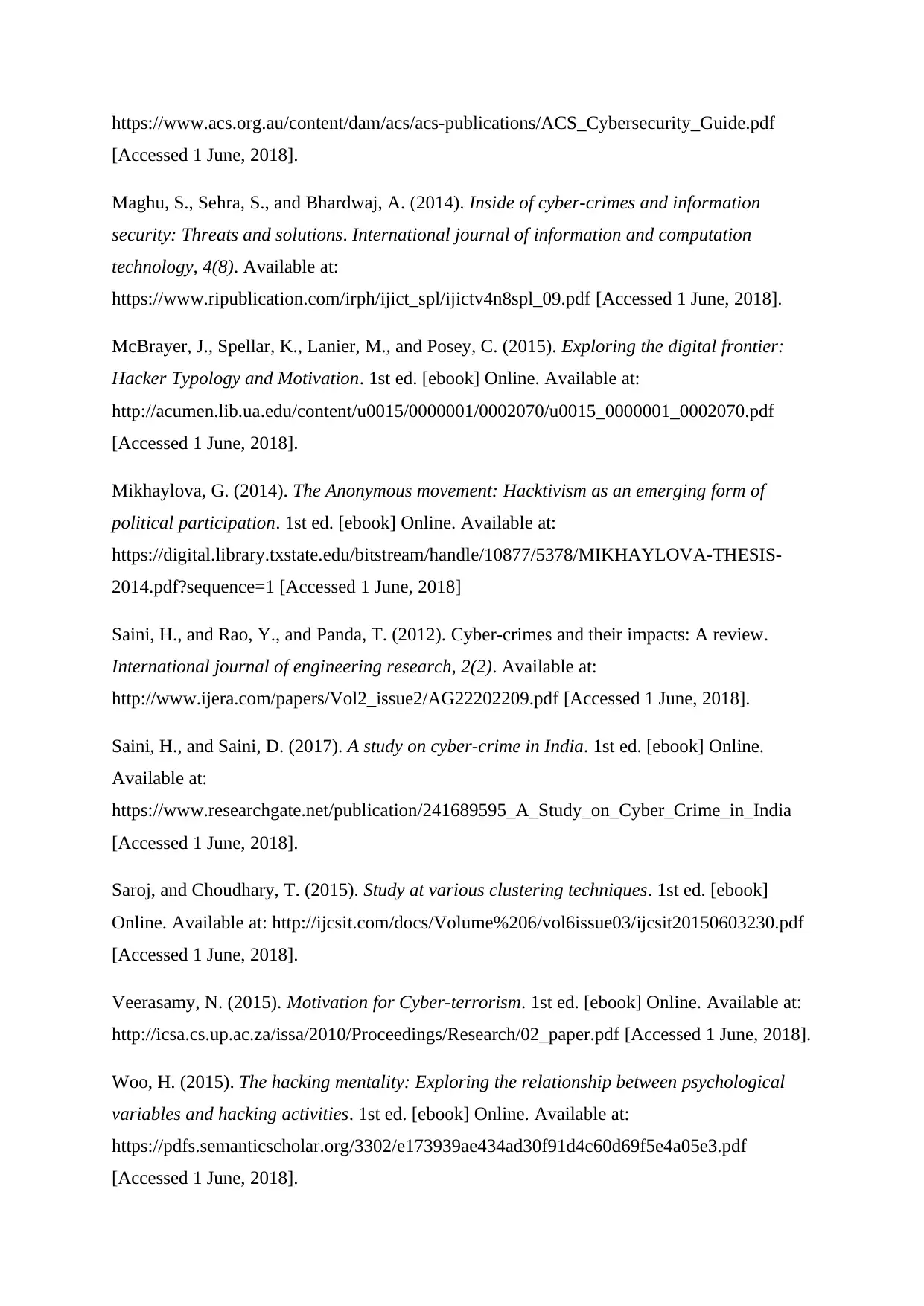
https://www.acs.org.au/content/dam/acs/acs-publications/ACS_Cybersecurity_Guide.pdf
[Accessed 1 June, 2018].
Maghu, S., Sehra, S., and Bhardwaj, A. (2014). Inside of cyber-crimes and information
security: Threats and solutions. International journal of information and computation
technology, 4(8). Available at:
https://www.ripublication.com/irph/ijict_spl/ijictv4n8spl_09.pdf [Accessed 1 June, 2018].
McBrayer, J., Spellar, K., Lanier, M., and Posey, C. (2015). Exploring the digital frontier:
Hacker Typology and Motivation. 1st ed. [ebook] Online. Available at:
http://acumen.lib.ua.edu/content/u0015/0000001/0002070/u0015_0000001_0002070.pdf
[Accessed 1 June, 2018].
Mikhaylova, G. (2014). The Anonymous movement: Hacktivism as an emerging form of
political participation. 1st ed. [ebook] Online. Available at:
https://digital.library.txstate.edu/bitstream/handle/10877/5378/MIKHAYLOVA-THESIS-
2014.pdf?sequence=1 [Accessed 1 June, 2018]
Saini, H., and Rao, Y., and Panda, T. (2012). Cyber-crimes and their impacts: A review.
International journal of engineering research, 2(2). Available at:
http://www.ijera.com/papers/Vol2_issue2/AG22202209.pdf [Accessed 1 June, 2018].
Saini, H., and Saini, D. (2017). A study on cyber-crime in India. 1st ed. [ebook] Online.
Available at:
https://www.researchgate.net/publication/241689595_A_Study_on_Cyber_Crime_in_India
[Accessed 1 June, 2018].
Saroj, and Choudhary, T. (2015). Study at various clustering techniques. 1st ed. [ebook]
Online. Available at: http://ijcsit.com/docs/Volume%206/vol6issue03/ijcsit20150603230.pdf
[Accessed 1 June, 2018].
Veerasamy, N. (2015). Motivation for Cyber-terrorism. 1st ed. [ebook] Online. Available at:
http://icsa.cs.up.ac.za/issa/2010/Proceedings/Research/02_paper.pdf [Accessed 1 June, 2018].
Woo, H. (2015). The hacking mentality: Exploring the relationship between psychological
variables and hacking activities. 1st ed. [ebook] Online. Available at:
https://pdfs.semanticscholar.org/3302/e173939ae434ad30f91d4c60d69f5e4a05e3.pdf
[Accessed 1 June, 2018].
[Accessed 1 June, 2018].
Maghu, S., Sehra, S., and Bhardwaj, A. (2014). Inside of cyber-crimes and information
security: Threats and solutions. International journal of information and computation
technology, 4(8). Available at:
https://www.ripublication.com/irph/ijict_spl/ijictv4n8spl_09.pdf [Accessed 1 June, 2018].
McBrayer, J., Spellar, K., Lanier, M., and Posey, C. (2015). Exploring the digital frontier:
Hacker Typology and Motivation. 1st ed. [ebook] Online. Available at:
http://acumen.lib.ua.edu/content/u0015/0000001/0002070/u0015_0000001_0002070.pdf
[Accessed 1 June, 2018].
Mikhaylova, G. (2014). The Anonymous movement: Hacktivism as an emerging form of
political participation. 1st ed. [ebook] Online. Available at:
https://digital.library.txstate.edu/bitstream/handle/10877/5378/MIKHAYLOVA-THESIS-
2014.pdf?sequence=1 [Accessed 1 June, 2018]
Saini, H., and Rao, Y., and Panda, T. (2012). Cyber-crimes and their impacts: A review.
International journal of engineering research, 2(2). Available at:
http://www.ijera.com/papers/Vol2_issue2/AG22202209.pdf [Accessed 1 June, 2018].
Saini, H., and Saini, D. (2017). A study on cyber-crime in India. 1st ed. [ebook] Online.
Available at:
https://www.researchgate.net/publication/241689595_A_Study_on_Cyber_Crime_in_India
[Accessed 1 June, 2018].
Saroj, and Choudhary, T. (2015). Study at various clustering techniques. 1st ed. [ebook]
Online. Available at: http://ijcsit.com/docs/Volume%206/vol6issue03/ijcsit20150603230.pdf
[Accessed 1 June, 2018].
Veerasamy, N. (2015). Motivation for Cyber-terrorism. 1st ed. [ebook] Online. Available at:
http://icsa.cs.up.ac.za/issa/2010/Proceedings/Research/02_paper.pdf [Accessed 1 June, 2018].
Woo, H. (2015). The hacking mentality: Exploring the relationship between psychological
variables and hacking activities. 1st ed. [ebook] Online. Available at:
https://pdfs.semanticscholar.org/3302/e173939ae434ad30f91d4c60d69f5e4a05e3.pdf
[Accessed 1 June, 2018].
Paraphrase This Document
Need a fresh take? Get an instant paraphrase of this document with our AI Paraphraser

Yassir, A., and Nayak, S. (2012). Cybercrime: A Threat to network security. International
journal of computer science and network security, 12(2). Available at:
http://paper.ijcsns.org/07_book/201202/20120214.pdf,[Accessed 1 June, 2018].
journal of computer science and network security, 12(2). Available at:
http://paper.ijcsns.org/07_book/201202/20120214.pdf,[Accessed 1 June, 2018].
1 out of 11
Your All-in-One AI-Powered Toolkit for Academic Success.
+13062052269
info@desklib.com
Available 24*7 on WhatsApp / Email
![[object Object]](/_next/static/media/star-bottom.7253800d.svg)
Unlock your academic potential
Copyright © 2020–2026 A2Z Services. All Rights Reserved. Developed and managed by ZUCOL.


